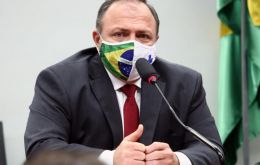MercoPress. South Atlantic News Agency
Tag: COVID-19
-
Monday, November 2nd 2020 - 08:23 UTC
Brazilian Health minister recovering from coronavirus in military hospital

Brazilian Health Minister Eduardo Pazuello, who is ill with COVID-19, will stay in a military hospital overnight on Sunday, after having been discharged from a civilian facility earlier in the day, the ministry said in a statement.
-
Monday, November 2nd 2020 - 07:20 UTC
Prince William contracted Covid-19 last April , “I didn't want to worry anyone”

Britain's Prince William contracted Covid-19 in April at a similar time to his father Prince Charles, British media reported late on Sunday, citing Kensington Palace sources. Prince William, the grandson of Queen Elizabeth and second-in-line to the British throne, kept his diagnosis a secret because he did not want to alarm the country, The Sun newspaper reported.
-
Saturday, October 31st 2020 - 08:33 UTC
Brazilian vice-president contradicts Bolsonaro, ”of course we will buy the (Chinese) vaccine”

Brazil's government will “of course” buy a Chinese COVID-19 vaccine that is being tested in the country, Vice President Hamilton Mourão said on Friday, in the latest example of him contradicting President Jair Bolsonaro.
-
Saturday, October 31st 2020 - 08:23 UTC
Cemeteries in Peru closed on Sunday, “Day of the Dead” to avoid agglomerations

Peru’s government, wary about the coronavirus pandemic despite a slowdown of new cases, has asked people to stay away from cemeteries for the important Day of the Dead celebration when millions usually pay respects to relatives who have died.
-
Saturday, October 31st 2020 - 08:07 UTC
Cruise industry: CDC drops the “No Sail” in favor of a strict Conditional Sailing Order

The U.S. Centers for Disease Control and Prevention (CDC) has dropped its controversial “No Sail” order in favor for a so-called Conditional Sailing Order. In short, the “No Sail” order has been lifted and the industry will work with the CDC on a realistic, phased-in return to service.
-
Friday, October 30th 2020 - 13:16 UTC
Dollar strapped Argentine government moves to recover “grabbed” land and evict squatters

Argentine anti-riot police clashed with a group of protesters on Thursday while evicting them from makeshift homes on a contested property south of the capital, Buenos Aires. Six police officers were injured and some forty people were arrested, according to authorities.
-
Friday, October 30th 2020 - 08:58 UTC
World Medical Association blasts leaders who discredit science and sponsor fake news on coronavirus

The spreading of fake news and discredited science by world leaders has led to many people dying and others being exposed to Covid-19, according to the departing President of the World Medical Association. In his valedictory address to this week’s WMA’s annual Assembly, Dr. Miguel Jorge, a psychiatrist from Brazil, mentioned both the Presidents of Brazil and the United States as contributing to more people being exposed to the virus and more deaths.
-
Friday, October 30th 2020 - 08:56 UTC
Catalonia closes borders and extends shutdown of bars and restaurants: hospitals overwhelmed

Catalonia announced on Thursday a 15-day ban on entering and exiting its territory, the latest in a series of restrictions taken by Spanish regions to try and contain rampant COVID-19 contagion.
-
Friday, October 30th 2020 - 08:22 UTC
Spanish coronavirus strain has spread across with the second wave in Europe

A coronavirus strain that emerged in Spain in June has spread across Europe and now makes up a large proportion of infections in several countries, researchers said, highlighting the role of travel in the pandemic and the need to track mutations.
-
Thursday, October 29th 2020 - 09:42 UTC
Argentina reported on Wednesday over 30,000 deaths from Covid-19

Argentina reported 30,071 deaths from Covid-19 on Wednesday, the Health Ministry confirmed in a statement, while more than 1,130.533 cases have been diagnosed positive since the virus first arrived in the country back in March.
